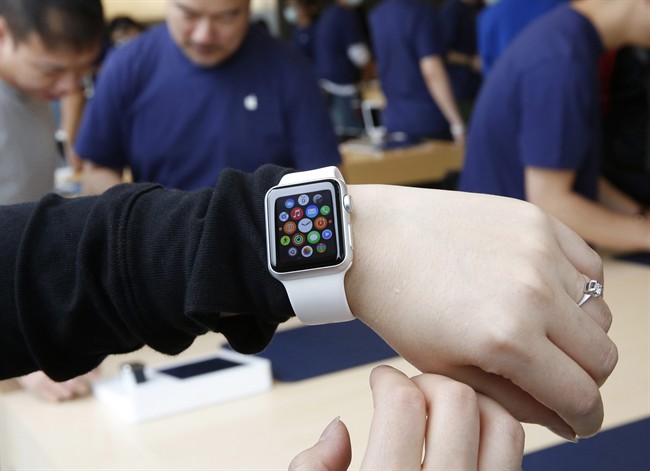TORONTO – More and more people are investing in smartwatches, thanks to high profile releases like the Apple Watch; but consumer adoption of the devices is raising questions about how smartwatches should be treated under distracted driving laws in Canada.

Last month a Quebec-area man was made a national example after being ticketed $120 and docked four demerit points for using his Apple Watch while driving.
The officer ticketed him under the same Quebec Highway Safety Code violation that prevents drivers from using a handheld device while on the road. The driver disagreed, arguing that the device couldn’t be counted as “hand held” because it’s worn on his wrist.
The case has shed light on how distracted driving legislation may have to change to cope with our ever changing technology.
Last week, Ontario unanimously passed legislation increasing penalties for drivers who text or use a handheld phone while on the road.
Using handheld electronic devices while driving, with the exception of making 911 calls, has been outlawed in Ontario since 2009 – but the law only forbids drivers from using handheld phones while behind the wheel.
It does not include language that would cover items like the Apple Watch, which can be used to make a phone call but only through the connection to the user’s phone.
Here’s how the distracted driving law in Ontario breaks down:
According to section 78.1 of the Highway Traffic Act, “No person shall drive a motor vehicle on a highway while holding or using a hand-held wireless communication device or other prescribed device that is capable of receiving or transmitting telephone communications, electronic data, mail or text messages.”
Under “Entertainment devices” the act reads:
“No person shall drive a motor vehicle on a highway while holding or using a hand-held electronic entertainment device or other prescribed device the primary use of which is unrelated to the safe operation of the motor vehicle.”
This leaves police with limitations as to how they can charge drivers who are caught using their smartwatches while driving, said Toronto Police Constable Clint Stibbe.
“Technology is advancing so quickly that our laws are struggling to keep up,” Stibbe told Global News.
But Stibbe – who noted that the current act still addresses the proper use of horse and buggy on Ontario roads – added that it’s not realistic to change the legislation based on every new device that comes out.
“The laws may not even be able to adapt in time for how long the device is around,” he said, using Google Glass as an example.
However, the Quebec government now says it will update the provincial highway safety code to include the Apple Watch and other similar electronic devices.
You can still be charged if your smartwatch is distracting you
Police are quick to note that distracted driving isn’t the only offence they can charge people with if their devices are getting in the way of safe driving.
According to OPP Sergeant Kerry Schmidt, if a driver is exhibiting erratic or dangerous driving behaviours due to a device like a smartwatch, police can charge them with careless driving.
“You might not be charged under distracted driving – you could be charged with something else like careless driving if you aren’t paying attention, or driving in a way that puts other drivers at risk,” Schmidt said.
READ MORE: Toronto car crashes – More distracted drivers, fewer drunk ones
The Highway Traffic Act defines careless driving as driving “a vehicle or street car on a highway without due care and attention or without reasonable consideration for other persons using the highway.”
Stibbe echoed the OPP’s response, adding Toronto Police are on the lookout for any form of distraction that will put the driver or others on the road at risk.
However, both Schmidt and Stibbe noted there has been no official talk from police organizations about looking for smartwatches in particular.






Comments